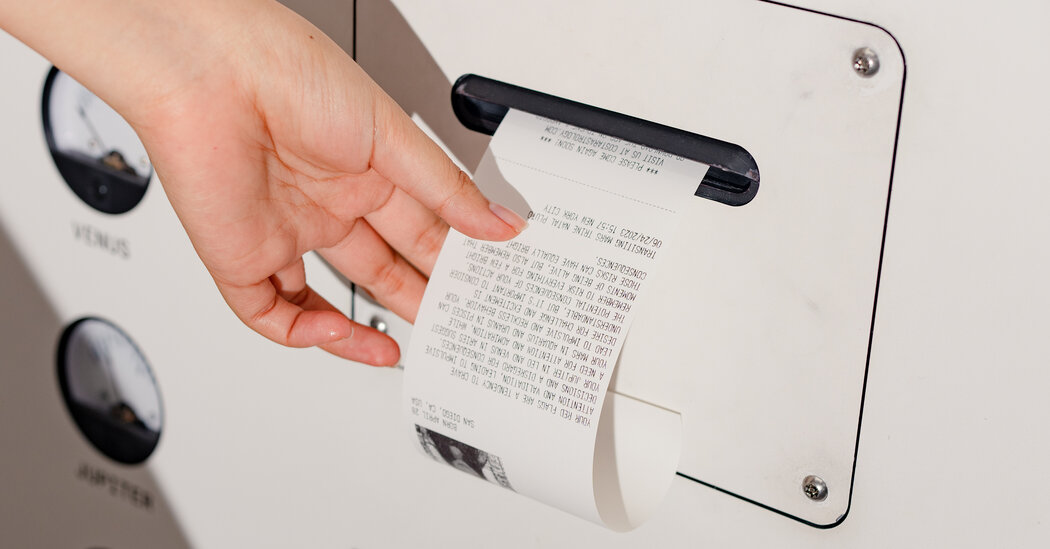The machine stood next to a deli counter and towered over cardboard boxes piled near the entrance to the Iconic Magazines store in NoLIta. It was shaped like an upright washer-dryer, with black knobs, rows of flashing lights, and gauges depicting celestial bodies—”sun,” “moon,” and the eight planets—on the front of the white facade.
“It could be something from NASA,” said Tim Wiedmann, a 27-year-old student from Germany who visited the store on a Wednesday night in June.
As Mr. Wiedmann stood in front of the machine, the front screen instructed him to “ask the stars”. With the help of a button he cycled through about 100 questions. Among them: How do I get better at my job? Do I have to leave New York? Should I start a cult?
After choosing a question, Mr. Wiedmann entered his date, time and place of birth. A message flashed on the screen that read in part: “All answers are based on astrological calculations.” The machine took its picture with the help of a built-in camera. A moment later it spat out a piece of paper with his grainy portrait on it and an answer to his question.
“It’s like someone’s in there,” said Mr. Wiedmann, who was one of many who came to use the machine that night. Sometimes lines would start to snake through the store as people waited for their turn. Many visitors said they had heard about the machine on TikTok, including two 19-year-old students.
“I asked for my red flags,” one of the students said of the question he chose, before the other student read aloud the machine’s printed answer.
She said: “Your red flags include a tendency to have high expectations and a fear of conflict. Your placement on Jupiter and Saturn suggests a need for perfectionism and fear of rejection. By avoiding conflict, you can limit your growth potential and meaningful connections. Remember that conflict is an inherent part of intimacy. Practice it with compassion and let go of unrealistic expectations.”
Like most of the people who used the machine that night, neither he nor she initially knew that the answers were being generated using artificial intelligence, including ChatGPT and GPT-3.
The machine was developed by Co-Star, a technology company with a buzzy astrology app that uses AI to generate readings. It will be in Iconic Magazines for most of the summer and move to Los Angeles later this year.
Astrologers have for centuries referred to the movement and positions of planets and other celestial bodies to inform readings and horoscopes. Co-Star follows similar methods, but the daily readings are prepared by AI that pulls text from a database written for the app by a team of astrologers and poets.
The machine, which was free to use, was created to promote Co-Star’s new in-app service, Embrace the Void, which starts at about $1. The service works similarly to the machine: users can ask open-ended questions not normally covered in the app’s astrological readings and receive answers generated by AI using Co-Star’s prepared-text database.
Banu Guler, 35, the founder of Co-Star, cited a range of aesthetic inspirations for the machine, including Soviet-era computers, devices used by NASA, photo booths, and vending and washing machines. It was also influenced by Zoltar’s fortune-telling machines that were once common attractions on boardwalks and arcades, she said.
“The best thing is that you can read your bit,” Ms. Guler said of the Zoltar machines. “And then you put your reading on your fridge, or in your book, or in your journal, or it hangs in the bottom of your bag for months, if you’re me.”
“Even though you know it’s junk, it’s special waste,” she added with a grin.
Before founding Co-Star in 2017, Ms. Guler worked in art sales. She said she taught herself at the time how to code AI that could predict how certain factors, such as the weather on the date of an auction, might affect the selling price of an artwork. She later used what she learned about AI to develop Co-Star.
“It was like, how can this fit into astrology?” she said.
“Astrology isn’t a perfect science, but there isn’t a perfect science either, which I don’t say in an anti-science way,” added Ms. Gler please. “I don’t believe science is perfect, and I don’t believe anything else is perfect because people are imperfect. And that’s cool. Like, really, it’s beautiful.
Vijender Sharma, a 35-year-old astrologer in northern India who specializes in Vedic astrology, said he used software to prepare readings. He said that because astrology was informed by science, as long as AI was trained with the right knowledge, he saw no harm in using the technology.
Susan Miller, an astrologer in New York who has been writing horoscopes for decades, was more skeptical. “AI is exciting for things like splitting atoms,” she said, adding that she wouldn’t trust such technology in a practice that often involves human emotions. “Machines make mistakes,” said Ms. Miller. “And the person who gets the answer can walk around with that wrong answer stuck in their head forever.”
After checking out the Co-Star machine in the magazine store, 23-year-old Nisarga Kadam, who works in financial technology in New York, was also skeptical of the AI-generated answers.
“It’s a bunch of practiced words put together,” Mrs. Kadam said. “It’s not personal.”
Anna Jonska, 26, a video director in New York, felt the opposite. Ms Jonska said she’s not the biggest fan of astrology and the machine’s use of AI made her rely on it even more.
“I’d rather believe an old lady leaning over a crystal ball is lying to me than a computer,” she said.

